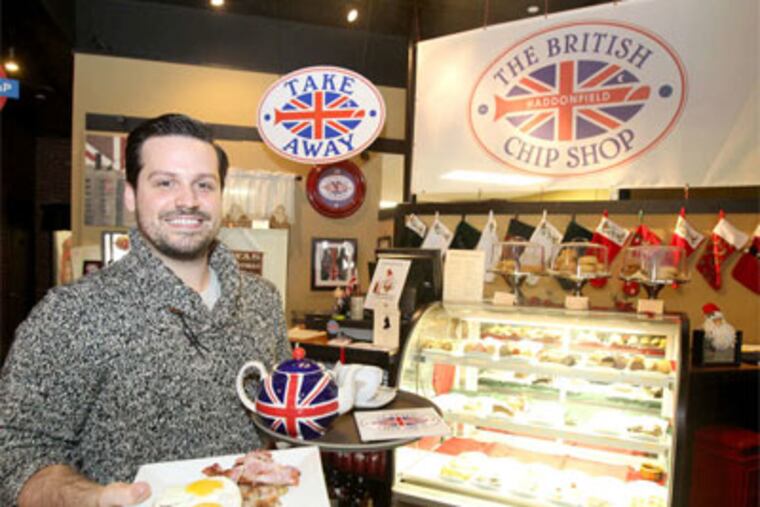Lingering mystery of Boxing Day, even among British expats
It shows up on calendars throughout the English-speaking world. On Dec. 26, an inch over from the biggest holiday on the Christian calendar, there it is: Boxing Day, usually followed by parentheses containing the letters U.K.

It shows up on calendars throughout the English-speaking world.
On Dec. 26, an inch over from the biggest holiday on the Christian calendar, there it is: Boxing Day, usually followed by parentheses containing the letters U.K.
Those who follow British culture and sports have heard the day referenced obliquely in period dramas and by soccer commentators. It popped up Saturday morning on a live telecast of a Tottenham-Stoke City match being shown in a Society Hill pub.
"There's a lot of soccer that day, but I don't know what the significance of it is," said Danny Hayde, 27, from Elizabethtown, Pa., as he watched the game in Cav's Dark Horse on Second Street.
"I think it's something to do with packing up your stuff," he said.
Across Britain and much of the Commonwealth - countries including Canada and New Zealand - Boxing Day is a public holiday that has become synonymous with shopping and a daylong schedule of sporting events.
But its origins are a mystery even to many of the British expatriates who call the Philadelphia region home.
Howard Silverstone, 52, a forensic accountant who moved to the United States from North London almost three decades ago, recounted thinking as a child that the day had something to do with boxing - perhaps the same mistake made in Ghana and other countries where bouts are routinely scheduled on Dec. 26.
"It wasn't until I was 14 or 15 I realized it had much deeper roots," said the Cherry Hill resident, who is former president of the British-American Business Council.
"No one can say it started on such-and-such a date," he said. "The common thread, we were always told, was it began in the Middle Ages." Something to do with "the way the land was owned, with the master and all the servants [who] worked on Christmas."
The story goes that Boxing Day was the servants' day off, and it was custom among landholders to give presents and food - enclosed in boxes.
While the holiday's patriarchal overtones are largely gone - the Royal Family does still stage hunting "shoots" that day - the term Christmas boxes still exists in British lingo.
As for the holiday's name? Perhaps it came from those gift boxes, or from the donation boxes at the entrance of churches in the Middle Ages. Some jokingly wonder if it refers to the fights between candy-fueled siblings that erupt the day after Christmas.
The British consulate in Washington couldn't offer any definitive answers.
Queen Victoria declared Boxing Day an official holiday in the mid-19th century. But when it first was observed is unknown, said Paul Smith, the embassy's cultural attaché.
"One of the first references was in the second half of the 17th century," Smith said. Samuel Pepys, a member of Parliament and famed diarist, "made reference in his journal to giving Christmas boxes to the servants. There's a lot of things around Christmas that are invented traditions."
For the British-style pubs and fish-and-chips shops that dot South Jersey and the Philadelphia area, Boxing Day is a chance to market to émigrés and Anglophiles looking for a taste of the isles.
At the British Chip Shop in Haddonfield, a Boxing Day menu is planned with bubble and squeak - a traditional concoction of leftover potatoes and vegetables sautéed in a pan - as its centerpiece. The dish is said to take its name from the sounds it makes while cooking.
"It's better than you would think," said owner Ed Strojan, 28, who got the idea to open the shop from his British stepfather a few years ago.
But for many expats, the holiday carries little weight beyond nostalgia.
During his childhood north of London, recalled Dark Horse chef Ben McNamara, Boxing Day was a chance for large groups of family and friends to get together and finish off what they hadn't eaten or drunk the day before. It gave them an extra day to revel in the holiday spirit and one another's company.
There's less of that now, he said, even among those who live in the old country.
Nick Perry, 45, an engineer who grew up near Manchester, takes a sardonic view.
"It's just another day off to watch sporting events and get drunk, when the women go out and go shopping," said the South Philadelphia resident, who was having lunch at the pub with his teenage children.
The Episcopal Diocese of Pennsylvania, which is affiliated with the Church of England, has no Boxing Day-related events listed, and a phone call to inquire about the holiday was not returned.
Even the cultural arm of the British Embassy in Washington, whose role is to promote British arts and traditions abroad, will let the day pass unmarked.
"We'll be closed," Smith said. "You can say that much."